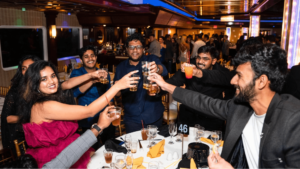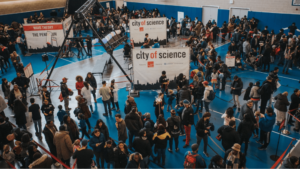As vaccination numbers rise and in-person events become more common again, many event creators are thinking about how they can best protect the health and safety of their communities. Some are also wondering how they can help promote the vaccination effort — because the more people who get vaccinated, the safer events will be.
Lately, you might have heard some buzz about whether proof of vaccination will become the norm for making live events, travel, lodging, and other occasions safer. And you may be wondering how vaccines and changing case counts will affect event planning this summer and beyond. These issues are all new, evolving, and complicated, especially for event creators who are ready to share their passions with an audience or community again. We’re keeping our pulse on the latest updates and have provided some here.
The evolving vaccine landscape
As the World Health Organization (WHO) says, “Vaccines are a critical new tool in the battle against COVID-19.” Officials note that the majority of those who test positive have not been fully vaccinated against the coronavirus. As of May 2021, everyone 12 years of age and older can make appointments.
Despite the evidence supporting the safety and effectiveness of COVID-19 vaccines, some people remain hesitant to get theirs. And infection rates have recently begun to increase in some locations due to the contagious Delta variant, leading health experts to reinforce the importance of getting vaccinated. Widespread vaccine adoption is expected to be critical in reducing the community prevalence of COVID-19, which will eventually enable larger public gatherings to take place with lower risk to event-goers. But the CDC has not yet fully approved medium or large indoor gatherings. They suggest outdoor events or smaller gatherings instead.
Vaccines are making air travel safer, which means we could see an increase in attendance from out-of-towners and have more flexibility when booking speakers and performers. The CDC says that there’s no longer a need for fully vaccinated people to get tested for COVID-19 or self-quarantine before or after travel. According to the Transportation Security Administration, it screened more than 10 million people over the Fourth of July holiday weekend (July 1 to July 5).
Vaccine verification
The landscape — and laws — around COVID-19 vaccine verification are rapidly evolving. Some event creators are requiring proof of vaccination for entry, while others are requiring all staff members to be vaccinated. Some are using vaccine status to determine which safety precautions apply to an individual attendee. At Yankee Stadium as well as many other sports venues throughout the country, attendees who show proof of vaccination will be able to sit in vaccinated-only sections, where they will not be required to wear masks or socially distance.
The legal implications of requiring proof of vaccination or a negative COVID-19 test are state specific and, in many cases, remain unclear. As of July 1, 18 states — Alabama, Alaska, Arizona, Delaware, Florida, Hawaii, Kansas, Louisiana, Michigan, Minnesota, New Jersey, North Dakota, Rhode Island, South Carolina, Tennessee, Texas, Vermont, and Wisconsin — had pending legislation that would prohibit private businesses from requiring patrons or customers to provide proof of vaccination for entrance.
New York City Mayor Bill de Blasio announced on Aug. 3 that people participating in indoor activities — such as dining at restaurants, going to the gym, and attending shows — will be required to provide proof of vaccination. The mandate is the first of its kind in the US, though similar policies exist in Italy and France. Enforcement will begin in September.
On July 29, President Biden announced that federal workers will be required to get vaccinated, or face new rules on mandatory masking, weekly testing, and distancing. Several state and local governments across the US — including California, New York, Maryland, Virginia, Nevada, and North Carolina — have begun to announce similar policies for some state workers.
Many individual businesses — such as restaurants, gyms, music festivals, and performing arts venues — are now requiring vaccines or proof of a negative COVID test to enter their establishments. Some venues are leaving it up to the performers to decide if there are vaccine or negative test requirements for individual events. Lollapalooza, the massive annual music festival held in Chicago in July, had such requirements, as will Chicago’s Riot Fest in September. Dead and Company, meanwhile, is requiring proof of vaccination to enter the general admission pit on each date of the band’s summer and fall tour. Smaller venues, such as the Bell House and Littlefield in New York, are already requiring full vaccination for all events.
There are various methods of verifying vaccine status, from self-attestation during registration, to showing your vaccine card at the door similar to showing your ID for an age check. The state of New York has launched its Excelsior Pass, a voluntary digital pass that businesses and venues can use to ensure patrons, or event attendees, meet any vaccination or testing requirements for entry. In addition, private software companies are developing apps that store test results and vaccine records and create scannable passes for entry to client venues.
Again, as you assess your COVID-19 safety protocols, including whether or not to implement vaccination or testing requirements for your events, make sure to comply with local laws, regulations, and orders. ADA accommodations may also be required for attendees who can’t get the vaccine for medical or religious reasons, such as the option to show a negative COVID-19 test result in lieu of vaccine verification, or to wear a mask and/or sit in a separate section. No matter what your policy is, be sure that it is clearly stated and enforced, including how you will handle refund requests for those who fail to comply.
As the landscape continues to evolve, you can also count on Eventbrite’s Events Industry Report to keep you in the loop on how event planners are navigating regulations and requirements.
Safety precautions
As a creator of live events, you can play a pivotal role in controlling the spread of the virus through adopting science-backed safety measures and protocols at your event. Variables like size, format, location, and food service at your event will dictate which safety measures you should put in place.
At this moment, with the recent rise in Delta variant cases, mask guidance is more inconsistent than ever. In late July, the CDC changed its mask guidance, recommending that fully vaccinated people wear masks indoors in areas “of substantial or high transmission.” The agency also now recommends universal masking in schools, and says vaccinated people should get tested for the virus if they come into contact with someone with COVID-19, even if they have no symptoms. W.H.O. officials continue to encourage vaccinated people to wear masks.
Many local governments have reimplemented indoor mask mandates for fully vaccinated individuals in recent weeks, including Los Angeles county, Washington, DC, Atlanta, Baltimore, MD, and San Francisco. As you determine your event’s policies, be sure to stay current on the latest guidance provided by the CDC and restrictions imposed by local authorities.
Get the Safety Playbook to help plan your event
We’re committed to helping event creators navigate the COVID-19 landscape. Our COVID-19 Safety Playbook for Events is the perfect place to start planning your next in-person event.
Notice: This article is provided for general information only and is not medical, legal, or professional advice. Eventbrite expressly disclaims liability for any loss or damage that results from any application of, or reliance upon, anything in this document by you, your agents, or your guests. Please consult your legal counsel, insurance advisor, and other professionals for tailored advice on your legal obligations and how to mitigate risk at your events.
Eventbrite has prepared these materials with information that it believes is current as of the date listed. Guidelines and information about the virus continue to change regularly. You should review the most up-to-date resources and applicable local laws, regulations, and orders on a regular basis leading up to your event, which should take precedence over any of the general information presented in this article.




